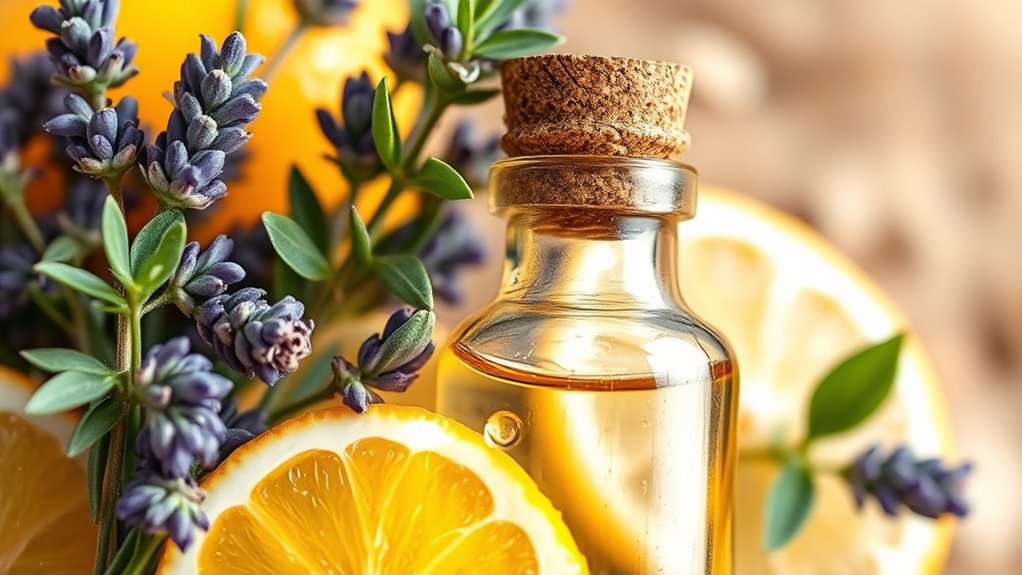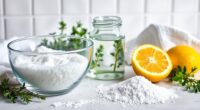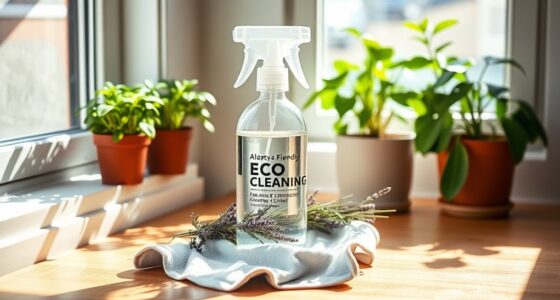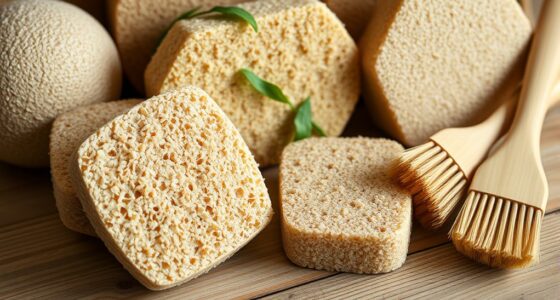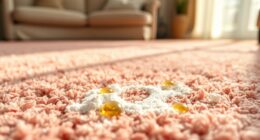Essential oils like lemon, tea tree, lavender, and eucalyptus offer a natural way to fill your home with fresh, inviting scents while also providing powerful cleaning benefits. They help eliminate bacteria, mold, and odors without harsh chemicals. You can use these oils to create DIY sprays or blends tailored to your preferences, making your space both fragrant and sanitary. Keep exploring how these versatile oils can transform your environment and routines, and discover even more ways to enjoy their benefits.
Key Takeaways
- Lemon, tea tree, and eucalyptus oils offer natural, antimicrobial cleaning properties and fresh fragrances for household use.
- Lavender and peppermint provide soothing scents that enhance relaxation and invigorate spaces naturally.
- DIY cleaning solutions with essential oils reduce reliance on harsh chemicals while leaving a pleasant aroma.
- Blending essential oils allows customization of fragrances and cleaning power tailored to preferences.
- Essential oils are versatile for aromatherapy and natural cleaning, promoting a healthier, chemical-free environment.
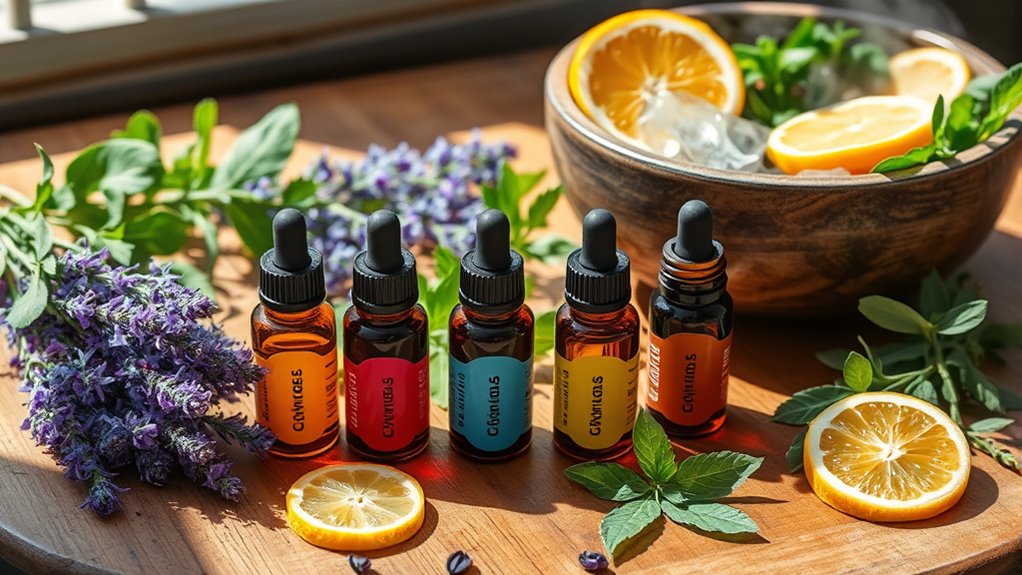
Essential oils are concentrated plant extracts known for their aromatic and therapeutic properties. When you incorporate them into your daily routines, you discover a world of natural fragrances and cleaning solutions that are both effective and eco-friendly. One of the biggest advantages of using essential oils is their ability to enhance your environment through aromatherapy benefits. The soothing scent of lavender can help you unwind after a long day, while the invigorating aroma of peppermint energizes your mornings. These oils can be diffused to create a calming atmosphere or applied topically (diluted) for targeted relaxation. By exploring different essential oils, you can tailor your space to suit your mood and needs, making your home a sanctuary of well-being.
In addition to their mental and emotional benefits, essential oils are powerful allies in natural cleaning. Their antimicrobial properties help eliminate bacteria, mold, and unpleasant odors without resorting to harsh chemicals. You can easily create your own cleaning products by adding a few drops of lemon or tea tree oil to vinegar or water-based sprays. These DIY essential oil blends are not only cost-effective but also safer for your family and the environment. Plus, they leave behind a fresh, natural scent that surpasses synthetic air fresheners. When cleaning your kitchen counters, bathroom tiles, or even laundry, using essential oils gives you confidence that you’re maintaining a healthy, chemical-free space.
Many people don’t realize how versatile essential oils are until they experiment with DIY recipes. Crafting your own blends allows for customization based on your preferences and needs. For example, combining eucalyptus and peppermint creates an invigorating blend perfect for clearing your sinuses, while a mix of chamomile and lavender offers a calming aroma for bedtime. When making these blends, you get to control the intensity of the scent and avoid artificial fragrances found in commercial products. Creating your own essential oil blends is easy and rewarding, giving you a personal touch to your home and self-care routines. Additionally, understanding the dreaming and lucid dreaming techniques can inspire new ways to relax and enhance your overall well-being.
Frequently Asked Questions
Are Essential Oils Safe for Pet Households?
Essential oils can be unsafe for pet households if you don’t prioritize pet safety. Always dilute oils properly and avoid using concentrated forms around pets, as many oils can be toxic. Keep oils out of your pet’s reach and consult a veterinarian before diffusing or applying oils. By practicing oil dilution and being cautious, you can help make certain your pets stay safe while enjoying the benefits of essential oils.
How Long Do Essential Oils Typically Last?
Think of essential oils as tiny bottled sunsets—bright and fleeting. Typically, they last 1 to 3 years, depending on storage lifespan and shelf stability. Keep them in a cool, dark place, and they’ll stay vibrant longer. Over time, they fade like a sunset at dusk, losing potency and aroma. Proper storage prolongs their magic, but eventually, even the most resilient oils surrender to time.
Can Essential Oils Be Used Directly on Skin?
You shouldn’t use essential oils directly on your skin without proper dilution, as doing so can cause skin sensitivity or irritation. Always dilute essential oils with a carrier oil like coconut or jojoba before applying, and do a patch test first. This guarantees safety and minimizes adverse reactions. Remember, using essential oils directly can be risky, so always prioritize dilution and safety guidelines for skin application.
What Are the Most Eco-Friendly Essential Oil Brands?
Did you know that over 80% of essential oil brands claim to prioritize eco-friendly practices? You should look for brands committed to sustainable sourcing and cruelty-free testing, as these guarantee minimal environmental impact and ethical treatment. Brands like doTERRA and Plant Therapy stand out for their transparency and eco-conscious efforts. Choosing such brands helps support responsible cultivation, reduces pollution, and promotes a healthier planet for future generations.
Do Essential Oils Expire or Go Bad Over Time?
Yes, essential oils do expire over time. Their shelf life typically ranges from 1 to 3 years, depending on the oil type. To keep them fresh, store your oils in a cool, dark place, tightly sealed, away from sunlight and heat. Proper storage tips help preserve their potency and prevent spoilage. Always check for changes in scent or color before use, and discard if they smell off or look cloudy.
Conclusion
Now that you know how essential oils add a natural touch to your home, you can truly make them work for you. Whether you’re freshening up your space or boosting your cleaning routine, these oils are your secret weapon. Remember, a little goes a long way, so don’t bite off more than you can chew. With consistency, you’ll see that they’re worth their weight in gold, turning your home into a fragrant, sparkling sanctuary.
